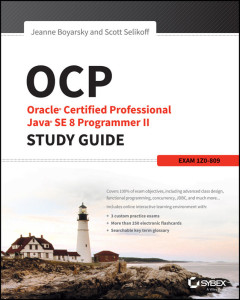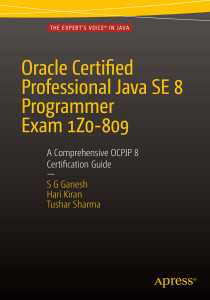The term OCPJP 8 refers Oracle Certified Professional, Java SE 8 Programmer certification name. This is an IT certification offered by Oracle for Java Programmers.
Quick overview of OCPJP 8
This is a professional level Java SE 8 Programmer certification which require Oracle Certified Associate, Java SE 8 Programmer certification as a prerequisite.
| Exam Number | 1Z0-809 |
| Duration | 150 |
| Exam Title | Java SE 8 Programmer II |
| Number of Questions | 85 |
| Passing Score | 65% |
| Java Version | SE 8 |
| Exam Format | Multiple Choice |
| Exam Price | Contact Oracle Site or Local Test Center |
What is OCPJP 8 book?
The books must cover real exam syllabus with good practice questions to prepare for OCPJP 8. You cannot use general Java books to prepare for this certification.
What are the topics must be covered in OCPJP 8 book?
The book must cover the following exam topics:
Java Class Design
- Implement encapsulation
- Implement inheritance including visibility modifiers and composition
- Implement polymorphism
- Override hashCode, equals, and toString methods from Object class
- Create and use singleton classes and immutable classes
- Develop code that uses static keyword on initialize blocks, variables, methods, and classes
Advanced Java Class Design
- Develop code that uses abstract classes and methods
- Develop code that uses the final keyword
- Create inner classes including static inner class, local class, nested class, and anonymous inner class
- Use enumerated types including methods, and constructors in an enum type
- Develop code that declares, implements and/or extends interfaces and use the @Override annotation.
- Create and use Lambda expressions
Generics and Collections
- Create and use a generic class
- Create and use ArrayList, TreeSet, TreeMap, and ArrayDeque objects
- Use java.util.Comparator and java.lang.Comparable interfaces
- Collections Streams and Filters
- Iterate using forEach methods of Streams and List
- Describe Stream interface and Stream pipeline
- Filter a collection by using lambda expressions
- Use method references with Streams
Lambda Built-in Functional Interfaces
- Use the built-in interfaces included in the java.util.function package such as Predicate, Consumer, Function, and Supplier
- Develop code that uses primitive versions of functional interfaces
- Develop code that uses binary versions of functional interfaces
- Develop code that uses the UnaryOperator interface
Java Stream API
- Develop code to extract data from an object using peek() and map() methods including primitive versions of the map() method
- Search for data by using search methods of the Stream classes including findFirst, findAny, anyMatch, allMatch, noneMatch
- Develop code that uses the Optional class
- Develop code that uses Stream data methods and calculation methods
- Sort a collection using Stream API
- Save results to a collection using the collect method and group/partition data using the Collectors class
- Use flatMap() methods in the Stream API
Exceptions and Assertions
- Use try-catch and throw statements
- Use catch, multi-catch, and finally clauses
- Use Autoclose resources with a try-with-resources statement
- Create custom exceptions and Auto-closeable resources
- Test invariants by using assertions
Use Java SE 8 Date/Time API
- Create and manage date-based and time-based events including a combination of date and time into a single object using LocalDate, LocalTime, LocalDateTime, Instant, Period, and Duration
- Work with dates and times across timezones and manage changes resulting from daylight savings including Format date and times values
- Define and create and manage date-based and time-based events using Instant, Period, Duration, and TemporalUnit
Java I/O Fundamentals
- Read and write data from the console
- Use BufferedReader, BufferedWriter, File, FileReader, FileWriter, FileInputStream, FileOutputStream, ObjectOutputStream, ObjectInputStream, and PrintWriter in the java.io package.
Java File I/O (NIO.2)
- Use Path interface to operate on file and directory paths
- Use Files class to check, read, delete, copy, move, manage metadata of a file or directory
- Use Stream API with NIO.2
Java Concurrency
- Create worker threads using Runnable, Callable and use an ExecutorService to concurrently execute tasks
- Identify potential threading problems among deadlock, starvation, livelock, and race conditions
- Use synchronized keyword and java.util.concurrent.atomic package to control the order of thread execution
- Use java.util.concurrent collections and classes including CyclicBarrier and CopyOnWriteArrayList
- Use parallel Fork/Join Framework
- Use parallel Streams including reduction, decomposition, merging processes, pipelines and performance.
Building Database Applications with JDBC
- Describe the interfaces that make up the core of the JDBC API including the Driver, Connection, Statement, and ResultSet interfaces and their relationship to provider implementations
- Identify the components required to connect to a database using the DriverManager class including the JDBC URL
- Submit queries and read results from the database including creating statements, returning result sets, iterating through the results, and properly closing result sets, statements, and connections
Localization
- Read and set the locale by using the Locale object
- Create and read a Properties file
- Build a resource bundle for each locale and load a resource bundle in an application
OCPJP 8 Preparation Books
The numbers are huge when you search on the internet for OCPJP 8 preparation. Find the list of OCPJP 8 books with Amazon user ratings.
|
|
OCP: Oracle Certified Professional Java SE 8 Programmer II Study Guide: Exam 1Z0-809 Dec 14, 2015by Jeanne Boyarsky and Scott Selikoff |
|
|
Oracle Certified Professional Java SE 8 Programmer Exam 1Z0-809: A Comprehensive OCPJP 8 Certification Guide
Dec 30, 2015 by SG Ganesh and Hari Kiran Kumar |
How to choose a best OCPJP 8 book?
Here are the tips to choose OCPJP 8 book.
Tip #1: Don’t rush and buy a book, do some research before purchase
Make the decision. Take action. There are may be fake negative reviews about a good book and positive review about a bad book. Do some research by reading sample chapters and read genuine reviews from Amazon or similar sites. The blogs/forums messages may be posted by respective vendors or competitors; so don’t trust with these reviews.
Tip #2: Don’t start with older OCPJP books
Do not buy older OCPJP books for your preparation. Buy book for latest version and start learning.
Tip #3: Work through MyExamCloud’s eBook, too.
It is more clinical and good program examples on each exam chapters. This is the study notes written when this exam was in BETA stage.
Tip #4: Understand your failures.
Each chapter of OCPJP 8 book ends with a few sample test questions. Practice these questions and improve your skills. MyExamCloud review quiz questions are direct questions from MyExamCloud eBook like flashcards.
Tip #5: Memorize all exam topics and more understanding.
Many aspiring OCPJP 8 initiates believe they can memorize their way to OCPJP 8 certification. Impatience, anger, and hatred of multiple choice exams lead many astray. They fall prey to misdirection of superfluous information in the question and are consumed by the distractor answers.
Remember, the exam will test your knowledge of the Java SE 8 Programming skills based on exam objective, not your Java programming experience. You might have accumulated years of professional experience and thousands of hours programming projects. However, the real exam may be tough if you are not prepared well with OCPJP 8 books.
Tip #8: Believe in yourself.
You’ve studied. You’ve worked hard. You’ve rested up. You will spot the correct answers. You will be an OCPJP 8 certified!





